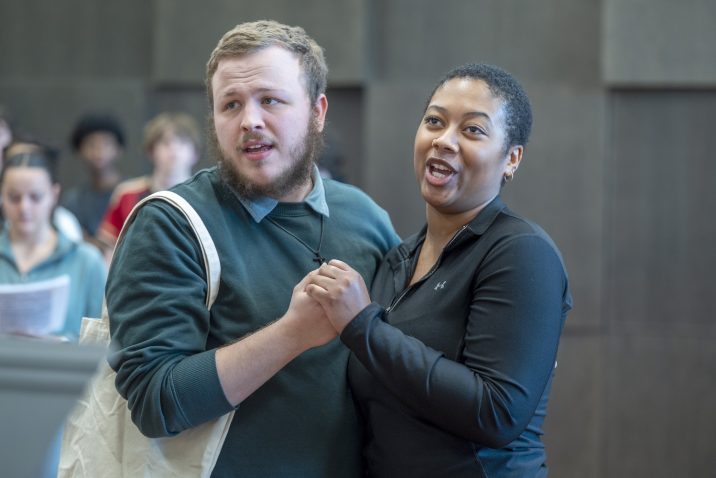Pamplin’s Isaac Brinberg named to ‘Georgia Trend’ 40 Under 40
"Being part of two cohorts of people who work tirelessly making a positive impact on their communities deeply inspires me in my role at AU," says Isaac Brinberg, DMA.

The Bachelor of Arts in Music with an Emphasis in Music Industry Studies provides students with specific industry-related courses, along with a flexible curriculum that blends creative skills with crucial business knowledge.
Music industry students develop the knowledge and skills as professionals who will enter the over $50 billion music industry. The program allows students to choose support courses for a minor in either Business Administration and/or Nonprofit Management, giving our students the edge in creating their own path to success for employment in the music industry. Our BA shares coursework with the Certificate of Less than One Year in Music Industry Studies.
The diverse course selection includes career development, music publishing and licensing, arts management, concert promotion and music marketing. These courses emphasize music business and are intended for anyone who wants to succeed in the modern music industry. Successful completion of courses culminates with an internship placement.

Certificate of Less than One Year in Music Industry Studies
A music industry studies certificate from Augusta University is ideal for all students who wish to pursue a career in the modern music industry. This program provides students with the expertise to work as professionals in virtually any area of the music industry. This certificate with an emphasis in music business, is designed for individuals in any degree program who love music and want to seek a career in music industry, regardless of having a background in music performance.

Introduction to Music Industry
This course presents a broad overview of the music industry, and explains how its various segments operate on a daily basis; the music business system, how music is marketed, promoted, distributed, and heard, who the key players are, importance of copyright, recording agreements, touring and future opportunities, and how did we get here? This course presents the career opportunities that are available within the industry, and the knowledge needed to achieve those goals.

Careers and Job Success in the Music Industry
This course will introduce the wide array of exciting professional careers within the music industry, including paths to: performance, artist management, recording, production, touring, teaching and alternative careers. Learn how much can be earned in these areas and what traits and skills are needed to successfully secure a job.

Artist Management and Concert Touring
This course will present the essential components of a successful tour: finding a manager/team, defining short and long term goals, contracts and deals, alternative streams of income, and who get paid and how much. Also covered will be merchandising and promotion techniques, and the technical side of touring: stage plots, sound and lights, and how to settle up the show when the music is over. This course will provide a detailed overview of the complete touring and music merchandising process.

Music Events and Promotion
This course provides an overview of key music marketing principles, terms, and practices which include merchandising, publicity, radio promotion (online and traditional), retail & distribution (online and traditional), advertising, and touring. This course will look at the opportunities available at both tradition terrestrial marketing opportunities, as well as online opportunities. Students will develop a timeline and a working marketing plan.

Music Publishing and Licensing
This course will present a conceptual understanding of basic licensing terms, opportunities, and strategies for intellectual property within the music industry. Included will be a mix of several real-life examples and hypothetical situations, along with review of actual agreements. Students will learn how to register works with relevant performing rights organizations, understand basic copyright terminology and learn the different licensing rights available to the artist, record label, and publisher.

"Being part of two cohorts of people who work tirelessly making a positive impact on their communities deeply inspires me in my role at AU," says Isaac Brinberg, DMA.

"It is also an honor to join the incredible list of past Top 10 in 10 recipients and see all they have done for the greater Augusta area," says Isaac Brinberg, DMA.

Mozart's "Die Zauberflöte (The Magic Flute)" will be performed by the Augusta University Opera Initiative, under the direction of Díana Thompson-Brewer, DMA, on Friday, March 22, and Saturday, March 23, at the Maxwell Performing Arts Theatre.

This significant investment was primarily aimed at bolstering areas where the university expects to see the most growth in core classes that first- and second-year students need to progress toward their degree, but the funding will also support all areas of enrollment growth through increasing student support in areas.